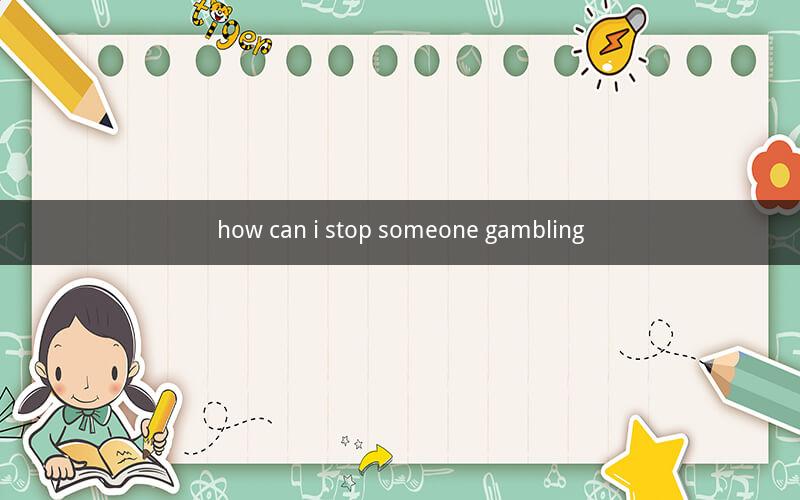
How Can I Stop Someone from Gambling?
Table of Contents
1. Understanding the Problem
2. Communication and Support
3. Setting Boundaries
4. Financial Management
5. Professional Help
6. Encouraging Alternatives
7. Support Groups
8. Monitoring and Accountability
9. Legal and Ethical Considerations
10. Long-Term Strategies
1. Understanding the Problem
The first step in addressing someone's gambling addiction is to understand the nature of the problem. Gambling can be an escape from reality, a way to cope with stress, or simply a thrilling pastime that has spiraled out of control. Recognizing the signs of a gambling addiction, such as secretive behavior, financial strain, and neglect of responsibilities, is crucial in developing an effective plan to help the individual.
2. Communication and Support
Open and honest communication is key. Have a conversation with the person about your concerns, using "I" statements to express your feelings without placing blame. Encourage them to share their feelings and experiences with you. It's important to offer support and empathy rather than judgment. Consider seeking the help of a professional counselor or therapist to facilitate this conversation.
3. Setting Boundaries
Establish clear boundaries regarding finances and access to gambling. This may involve removing credit cards, limiting access to cash, or setting strict rules about when and where gambling is allowed. Setting boundaries helps to create a safer environment and can prevent the individual from engaging in risky behavior.
4. Financial Management
Take control of the individual's financial situation by helping them manage their debts and expenses. This may involve budgeting, negotiating with creditors, or seeking financial counseling. Ensuring that their basic needs are met can reduce the temptation to gamble as a means of coping with financial stress.
5. Professional Help
Encourage the individual to seek professional help from a therapist or counselor specializing in gambling addiction. Therapy can provide tools and strategies for overcoming addiction, as well as support from others who have faced similar challenges.
6. Encouraging Alternatives
Help the individual find healthy alternatives to gambling. This could include hobbies, exercise, social activities, or other interests that provide a sense of fulfillment and distraction from the urge to gamble.
7. Support Groups
Encourage the person to join a support group for individuals struggling with gambling addiction. Groups like Gamblers Anonymous offer a community of peers who understand the struggles and can provide encouragement and guidance.
8. Monitoring and Accountability
Monitor the individual's behavior and hold them accountable for their actions. Keep an eye on their financial and social activities, and be prepared to intervene if you notice signs of relapse. Encourage them to keep a journal or log of their gambling activities to increase self-awareness.
9. Legal and Ethical Considerations
In some cases, legal intervention may be necessary. This could involve seeking a court order to freeze assets or place restrictions on gambling activities. It's important to consult with a legal professional to understand the options available and to ensure that the individual's rights are protected.
10. Long-Term Strategies
Developing long-term strategies is essential for maintaining sobriety. This may include ongoing therapy, participation in support groups, and regular check-ins with friends and family. It's important to recognize that recovery is a lifelong process and that setbacks are possible.
10 Questions and Answers
Question 1: What are the signs of a gambling addiction?
Answer: Signs of a gambling addiction include secretive behavior, financial strain, neglect of responsibilities, and an increasing need to gamble to achieve the same thrill.
Question 2: How can I help someone who is hiding their gambling problem?
Answer: Encourage open communication and express your concerns without judgment. Offer support and empathy, and consider seeking the help of a professional counselor to facilitate the conversation.
Question 3: Is it possible to stop gambling without professional help?
Answer: While it is possible to stop gambling without professional help, it can be challenging. Professional help can provide valuable tools, support, and strategies for overcoming addiction.
Question 4: What should I do if the person I'm concerned about refuses to seek help?
Answer: Continue to offer support and encouragement. Consider involving a professional counselor or therapist who can help address the individual's resistance to seeking help.
Question 5: How can I help someone who has lost a significant amount of money due to gambling?
Answer: Help them manage their financial situation by budgeting, negotiating with creditors, and seeking financial counseling. Ensure that their basic needs are met to reduce the temptation to gamble.
Question 6: Are there any legal options available to help someone stop gambling?
Answer: Yes, legal intervention may be possible, such as seeking a court order to freeze assets or place restrictions on gambling activities. Consult with a legal professional to understand the options available.
Question 7: How can I support someone in a support group for gambling addiction?
Answer: Attend meetings with them, offer to drive them to and from meetings, and be available to listen and provide emotional support.
Question 8: Can a gambling addiction be cured?
Answer: While there is no cure for gambling addiction, it can be managed and overcome with the right support, treatment, and strategies.
Question 9: How long does it take to recover from a gambling addiction?
Answer: Recovery from a gambling addiction is a lifelong process. The time it takes to recover can vary widely from person to person.
Question 10: What can I do to prevent a gambling addiction from happening to me or someone I care about?
Answer: Educate yourself about the risks of gambling, set boundaries, and be aware of the signs of addiction. Encourage healthy habits and alternatives to gambling for stress relief and entertainment.